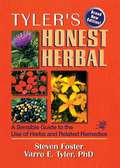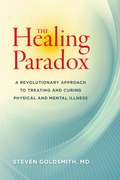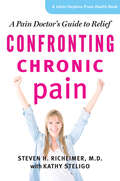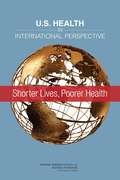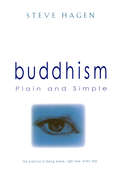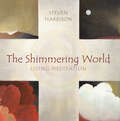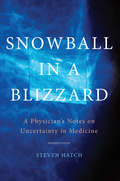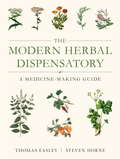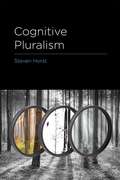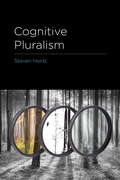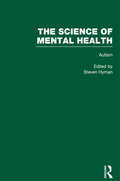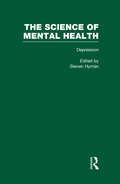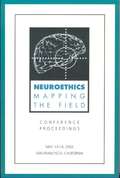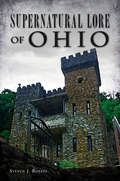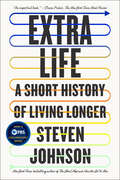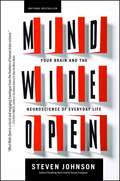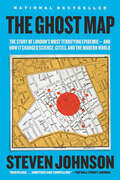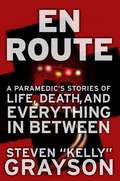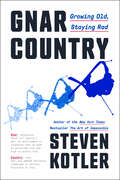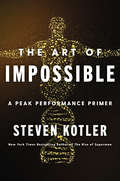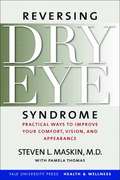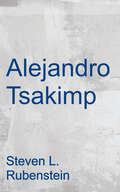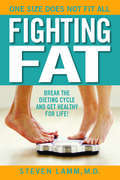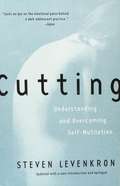- Table View
- List View
Tyler's Honest Herbal: A Sensible Guide to the Use of Herbs and Related Remedies
by Steven FosterHere is the fourth edition of Tyler's Honest Herbal: A Sensible Guide to the Use of Herbs and Related Remedies, providing essential botanical information as well as folkloric background of herbal remedies in a clear, accessible style. Unlike other herb books, this book gives you a serious evaluation of both the positive and negative features of the
The Healing Paradox: A Revolutionary Approach to Treating and Curing Physical and Mental Illness
by Steven GoldsmithWhy does Western medicine fail to cure chronic physical and mental illness? Why do so many treatments and drugs work only for a limited time before eventually losing effectiveness or producing harmful side effects? Dr. Steven Goldsmith's answer is at once counterintuitive and commonsensical: the root of the problem is our combative approach. Instead of resisting and fighting our ailments, we should cooperate with and even embrace them. We should look for and apply treatments that are integrated with the causes of illness, not regard illness as an enemy to conquer. This "hair of the dog" principle is already widely evident in practice. Take, for example, vaccines and inoculations, which are small doses of the microbes that cause the diseases being prevented; the use of the stimulant Ritalin to calm and ground people with Attention Deficit Hyperactivity Disorder; and radiation, which is both a well-known cause of cancer and a well-known method of treating it. These are just a few of Goldsmith's many examples, which he relays in clear, evocative, and thought-provoking language. Perhaps most compelling of all, he explores reasons why this clearly effective principle is ignored by Western medicine. Drawing on fascinating case studies and personal experiences from his forty-year career as a medical doctor and psychiatrist--as well as abundant clinical, experimental, and public health data that support his seemingly paradoxical assertion--Dr. Goldsmith presents an exciting, revolutionary approach that will change the way you think about medicine and psychotherapy.¶From the Trade Paperback edition.fective principle is ignored by Western medicine. Drawing on fascinating case studies and personal experiences from his forty-year career as a medical doctor and psychiatrist--as well as abundant clinical, experimental, and public-health data that support his radical assertion--Dr. Goldsmith presents an exciting, revolutionary approach that will change the way you think about treating mental and physical illness.From the Trade Paperback edition.
Confronting Chronic Pain: A Pain Doctor's Guide to Relief (A Johns Hopkins Press Health Book)
by Steven H. RicheimerA holistic approach to pain management from a recognized leader in the field.This comprehensive guide is designed to help everyone whose days are filled with chronic pain—the kind of pain that truly is a disease unto itself. Where does chronic pain come from, and why doesn’t it go away? Dr. Steven H. Richeimer, an eminent voice in the field of pain management, answers these and other fundamental questions about chronic pain. Board certified in pain medicine, anesthesiology, and psychiatry, he knows that the stress of persistent pain quickly takes a toll on the body and the mind. And he has helped thousands of people reduce their pain and reclaim their lives.In Confronting Chronic Pain, Dr. Richeimer discusses what causes pain in such disorders as arthritis, cancer, fibromyalgia, chronic headache, and back pain—and describes how to get relief. He provides clear and up-to-date information about pain medications, exercise and nutrition, injections and neurostimulators, and complementary therapies. He also explains the many approaches to managing the social and emotional aspects of pain.Understanding that chronic pain affects the spirit, he offers seven spiritual tools for moving beyond pain; understanding that chronic pain affects the whole family, he has created an action plan for family harmony; understanding the emotional component of people in pain, he helps them solve the chronic pain puzzle."Just learn to live with it" is not a satisfactory response to someone living with chronic pain. Dr. Richeimer’s compassionate and holistic approach can help soften the harsh edges of pain and provide hope for the future.
U.S. Health in International Perspective
by Steven H. WoolfThe United States is among the wealthiest nations in the world, but it is far from the healthiest. Although life expectancy and survival rates in the United States have improved dramatically over the past century, Americans live shorter lives and experience more injuries and illnesses than people in other high-income countries. The U. S. health disadvantage cannot be attributed solely to the adverse health status of racial or ethnic minorities or poor people: even highly advantaged Americans are in worse health than their counterparts in other, "peer" countries. In light of the new and growing evidence about the U. S. health disadvantage, the National Institutes of Health asked the National Research Council (NRC) and the Institute of Medicine (IOM) to convene a panel of experts to study the issue. The Panel on Understanding Cross-National Health Differences Among High-Income Countries examined whether the U. S. health disadvantage exists across the life span, considered potential explanations, and assessed the larger implications of the findings. U. S. Health in International Perspective presents detailed evidence on the issue, explores the possible explanations for the shorter and less healthy lives of Americans than those of people in comparable countries, and recommends actions by both government and nongovernment agencies and organizations to address the U. S. health disadvantage.
Buddhism Plain and Simple
by Steven HagenBuddhism Plain and Simple offers a clear, straightforward treatise on Buddhism in general and on awareness in particular.When Buddha was asked to sum up his teaching in a single world, he said, "Awareness." The Buddha taught how to see directly into the nature of experience. His observations and insights are plain, practical, and down-to-earth, and they deal exclusively with the present.Longtime teacher of Buddhism Steve Hagan presents the Buddha's uncluttered, original teachings in everyday, accessible language unencumbered by religious ritual, tradition, or belief.
The Shimmering World: Living Meditation
by Steven Harrison"In the face of the vastness, the magic, the unknown quality of life, and in a moment of true humility, we may discover the actuality that washes away all our concepts." The words in this exquisite little book provide us with a portal to that discovery. Pairing the stunning paintings of Richard Stodart with the profound words of Steven Harrison, The Shimmering World evokes the mysterious alchemy of stillness that transforms us. A marvelous gift for anyone who is moving through a great transition or wants to change their life, and a companion book for those who need to reach deeper within to come face to face with their truth.
Snowball in a Blizzard: A Physician's Notes on Uncertainty in Medicine
by Steven HatchThere's a running joke among radiologists: finding a tumor in a mammogram is akin to finding a snowball in a blizzard. A bit of medical gallows humor, this simile illustrates the difficulties of finding signals (the snowball) against a background of noise (the blizzard). Doctors are faced with similar difficulties every day when sifting through piles of data from blood tests to X-rays to endless lists of patient symptoms. Diagnoses are often just educated guesses, and prognoses less certain still. There is a significant amount of uncertainty in the daily practice of medicine, resulting in confusion and potentially deadly complications. Dr. Steven Hatch argues that instead of ignoring this uncertainty, we should embrace it. By digging deeply into a number of rancorous controversies, from breast cancer screening to blood pressure management, Hatch shows us how medicine can fail--sometimes spectacularly--when patients and doctors alike place too much faith in modern medical technology. The key to good health might lie in the ability to recognize the hype created by so many medical reports, sense when to push a physician for more testing, or resist a physician's enthusiasm when unnecessary tests or treatments are being offered. Both humbling and empowering, Snowball in a Blizzard lays bare the inescapable murkiness that permeates the theory and practice of modern medicine. Essential reading for physicians and patients alike, this book shows how, by recognizing rather than denying that uncertainty, we can all make better health decisions.
The Modern Herbal Dispensatory: A Medicine-Making Guide
by Steven Horne Thomas EasleyThis comprehensive, full-color guide provides detailed, easy-to-follow instructions for making and using approximately 250 herbal medicines at home, including practical tips and numerous effective formulas developed and tested by the authors, both expert herbalists with years of experience. Readers who appreciate the health-giving properties of herbal medicines but are discouraged by the high price of commercial products can now make their own preparations for a fraction of the cost. The authors tell you everything you need to know about harvesting, preparing, and administering herbs in many different forms, including fresh, bulk dried herbs, capsules, extracts in water, alcohol, glycerin, vinegar and oil, and even preparations like essential oils and flower essences. The book also covers topical applications of herbs as salves, lotions, poultices, tooth powders, ear drops, and more, and includes an extensive chapter on herbal hydrotherapy. The Modern Herbal Dispensary explains why different preparations of the same herb will obtain better results, demonstrating how capsules, teas, tinctures, or glycerites of the same plant will not have exactly the same effect on the body. Leading herbalists Thomas Easley and Steven Horne have tested and proven the herbal formulas they offer, along with suggestions for treating more than one hundred illnesses. They lay out the principles of herbal formulation and also provide instructions on how to prepare single herbs, a procedure that has been largely ignored in other references. More comprehensive than any other guide, thoroughly researched, beautifully illustrated, and presented with ease of use in mind, this book will take its place as the premier reference for those who want to produce all the herbal remedies they need, and to save money in the process.From the Trade Paperback edition.
Cognitive Pluralism
by Steven HorstPhilosophers have traditionally assumed that the basic units of knowledge and understanding are concepts, beliefs, and argumentative inferences. In Cognitive Pluralism, Steven Horst proposes that another sort of unit -- a mental model of a content domain -- is the fundamental unit of understanding. He argues that understanding comes not in word-sized concepts, sentence-sized beliefs, or argument-sized reasoning but in the form of idealized models and in domain-sized chunks. He argues further that this idea of "cognitive pluralism" -- the claim that we understand the world through many such models of a variety of content domains -- sheds light on a number of problems in philosophy.Horst first presents the "standard view" of cognitive architecture assumed in mainstream epistemology, semantics, truth theory, and theory of reasoning. He then explains the notion of a mental model as an internal surrogate that mirrors features of its target domain, and puts it in the context of ideas in psychology, philosophy of science, artificial intelligence, and theoretical cognitive science. Finally, he argues that the cognitive pluralist view not only helps to explain puzzling disunities of knowledge but also raises doubts about the feasibility of attempts to "unify" the sciences; presents a model-based account of intuitive judgments; and contends that cognitive pluralism favors a reliabilist epistemology and a "molecularist" semantics. Horst suggests that cognitive pluralism allows us to view rival epistemological and semantic theories not as direct competitors but as complementary accounts, each an idealized model of different dimensions of evaluation.
Cognitive Pluralism
by Steven HorstAn argument that we understand the world through many special-purpose mental models of different content domains, and an exploration of the philosophical implications.Philosophers have traditionally assumed that the basic units of knowledge and understanding are concepts, beliefs, and argumentative inferences. In Cognitive Pluralism, Steven Horst proposes that another sort of unit—a mental model of a content domain—is the fundamental unit of understanding. He argues that understanding comes not in word-sized concepts, sentence-sized beliefs, or argument-sized reasoning but in the form of idealized models and in domain-sized chunks. He argues further that this idea of “cognitive pluralism”—the claim that we understand the world through many such models of a variety of content domains—sheds light on a number of problems in philosophy.Horst first presents the “standard view” of cognitive architecture assumed in mainstream epistemology, semantics, truth theory, and theory of reasoning. He then explains the notion of a mental model as an internal surrogate that mirrors features of its target domain, and puts it in the context of ideas in psychology, philosophy of science, artificial intelligence, and theoretical cognitive science. Finally, he argues that the cognitive pluralist view not only helps to explain puzzling disunities of knowledge but also raises doubts about the feasibility of attempts to “unify” the sciences; presents a model-based account of intuitive judgments; and contends that cognitive pluralism favors a reliabilist epistemology and a “molecularist” semantics. Horst suggests that cognitive pluralism allows us to view rival epistemological and semantic theories not as direct competitors but as complementary accounts, each an idealized model of different dimensions of evaluation.
Autism: The Science of Mental Health (The Science of Mental Health #2)
by Steven HymanThe Science of Mental Health: Volume 2: Autism by Steven Hyman
Depression: The Science of Mental Health
by Steven HymanFirst Published in 2002. In common usage, the term "depression" can refer to the state of being sad or blue, but it also signifies a serious clinical syndrome that affects approximately 10 percent of people at some point in their lives. This clinical syndrome may occur as a primary illness or as a complication of ("secondary to") another mental disorder such as schizophrenia, a medical condition such as hypothyroidism, or the effects of a drug. Based on studies of clinical courses and outcomes, treatment responses, and familial patterns of depression, primary depressive illness is dichotomized into unipolar (depressions only) and bipolar. In bipolar disorder, or manic-depressive illness, depressions are interspersed with manias- periods of elevated mood, high energy, and lack of sleep. Bipolar disorder is described in a separate volume.
Neuroethics: Mapping the Field
by Steven J. MarcusThis volume contains the proceedings of a two-day multidisciplinary conference on the ethical implications of brain research organized by Stanford University and the University of California, San Francisco. Leaders in neuroscience, journalism, law, and philosophy, among other fields, engaged in a freewheeling debate on the social and individual effects of the research. Steven Marcus has edited their formal and informal deliberations to present a compelling first-hand account of the proceedings, providing a highly readable front-row seat about the first-ever symposium on neuroethics.
Supernatural Lore of Ohio (American Heritage)
by Steven J. RolfesA rich vein of bizarre and uncanny tales snakes through Ohio's cornfields and cityscapes. In the earliest days of statehood, dark reports spoke of witches causing feathers to form a deadly ring in one's bed, magically strangling its sleeping victims. For years, the ghost of Abraham Lincoln's funeral train rolled through Urbana, a small town in the center of the state, and caused clocks and watches to stop in its wake. A vampiric entity was said to haunt a strange cabin in the Black Swamp, and a werewolf reportedly roamed a Defiance train yard. Join Cincinnati historian Steven J. Rolfes on a tour of Ohio's strangest supernatural lore, from wailing banshees to the devil himself.
Extra Life (Young Readers Adaptation): The Astonishing Story of How We Doubled Our Lifespan
by Steven JohnsonA young readers adaptation of Steven Johnson's Extra Life, the story of how humans have doubled our lifespan in less than a century—and what to do with the extra life we now have.Humans live longer now than they ever have in their more than three hundred thousand years of existence on earth. And most (if not all) of the advances that have permitted the human lifespan to double have happened in living memory. Extra Life looks at vaccines, seat belts, pesticides, and more, and how each of our scientific advancements have prolonged human life. This book is a deep dive into the sciences--perfect for younger readers who enjoy modern history as well as scientific advances.
Extra Life: A Short History of Living Longer
by Steven JohnsonAs featured in The New York Times Magazine, and on an upcoming PBS documentary series: the surprising and important story of how humans gained what amounts to an extra life, from the bestselling author of How We Got to Now and Where Good Ideas Come From As a species we have doubled our life expectancy in just one hundred years. All the advances of modern life—the medical breakthroughs, the public health institutions, the rising standards of living—have given us each about twenty thousand extra days on average. There are few measures of human progress more astonishing than our increased longevity. This book is Steven Johnson&’s attempt to understand where that progress came from. How many of those extra twenty thousand days came from vaccines, or the decrease in famines, or seatbelts? What are the forces that now keep us alive longer? Behind each breakthrough lies an inspiring story of cooperative innovation, of brilliant thinkers bolstered by strong systems of public support and collaborative networks. But it is not enough simply to remind ourselves that progress is possible. How do we avoid decreases in life expectancy as our public health systems face unprecedented challenges? What current technologies or interventions that could reduce the impact of future crises are we somehow ignoring? A study in how meaningful change happens in society, Extra Life is an ode to the enduring power of common goals and public resources. The most fundamental progress we have experienced over the past few centuries has not come from big corporations or start-ups. It has come, instead, from activists struggling for reform; from university-based and publicly funded scientists sharing their findings open-source-style; and from nonprofit agencies spreading new innovations around the world.
Mind Wide Open: Your Brain and the Neuroscience of Everyday Life
by Steven JohnsonBRILLIANTLY EXPLORING TODAY'S CUTTING-EDGE BRAIN RESEARCH, MIND WIDE OPEN IS AN UNPRECEDENTED JOURNEY INTO THE ESSENCE OF HUMAN PERSONALITY, ALLOWING R<P>EADERS TO UNDERSTAND THEMSELVES AND THE PEOPLE IN THEIR LIVES AS NEVER BEFORE. Using a mix of experiential reportage, personal storytelling, and fresh scientific discovery, Steven Johnson describes how the brain works -- its chemicals, structures, and subroutines -- and how these systems connect to the day-to-day realities of individual lives. For a hundred years, he says, many of us have assumed that the most powerful route to self-knowledge took the form of lying on a couch, talking about our childhoods. The possibility entertained in this book is that you can follow another path, in which learning about the brain's mechanics can widen one's self-awareness as powerfully as any therapy or meditation or drug. <P> In Mind Wide Open, Johnson embarks on this path as his own test subject, participating in a battery of attention tests, learning to control video games by altering his brain waves, scanning his own brain with a $2 million fMRI machine, all in search of a modern answer to the oldest of questions: who am I? <P> Along the way, Johnson explores how we "read" other people, how the brain processes frightening events (and how we might rid ourselves of the scars those memories leave), what the neurochemistry is behind love and sex, what it means that our brains are teeming with powerful chemicals closely related to recreational drugs, why music moves us to tears, and where our breakthrough ideas come from. <P> Johnson's clear, engaging explanation of the physical functions of the brain reveals not only the broad strokes of our aptitudes and fears, our skills and weaknesses and desires, but also the momentary brain phenomena that a whole human life comprises. Why, when hearing a tale of woe, do we sometimes smile inappropriately, even if we don't want to? Why are some of us so bad at remembering phone numbers but brilliant at recognizing faces? Why does depression make us feel stupid? <P> To read Mind Wide Open is to rethink family histories, individual fates, and the very nature of the self, and to see that brain science is now personally transformative -- a valuable tool for better relationships and better living.
The Ghost Map: The Story of London's Most Terrifying Epidemic--and How It Changed Science, Cities, and the Modern World
by Steven JohnsonA National Bestseller, a New York Times Notable Book, and an Entertainment Weekly Best Book of the Year from the author of Extra Life &“By turns a medical thriller, detective story, and paean to city life, Johnson's account of the outbreak and its modern implications is a true page-turner.&” —The Washington Post &“Thought-provoking.&” —Entertainment Weekly It's the summer of 1854, and London is just emerging as one of the first modern cities in the world. But lacking the infrastructure-garbage removal, clean water, sewers-necessary to support its rapidly expanding population, the city has become the perfect breeding ground for a terrifying disease no one knows how to cure. As the cholera outbreak takes hold, a physician and a local curate are spurred to action-and ultimately solve the most pressing medical riddle of their time. In a triumph of multidisciplinary thinking, Johnson illuminates the intertwined histories of the spread of disease, the rise of cities, and the nature of scientific inquiry, offering both a riveting history and a powerful explanation of how it has shaped the world we live in.
En Route: A Paramedic's Stories of Life, Death, and Everything in Between
by Steven Kelly GraysonStephen "Kelly" Grayson has seen the best of us at our worst. When hearts stop working, when blood alcohol levels exceed limits we shouldn't contemplate, when bodies are extricated from car wrecks, he's been there to pick up the pieces, save our lives, and watch us slip away. His touching stories of life and death and the hilarious ones of times in between are here to give us an insight of what happens after we call 911, the ambulance doors close, or even what happens inside the ER when the nurse shows the family to the waiting room.
Gnar Country: Growing Old, Staying Rad
by Steven KotlerThe New York Times bestselling author and human performance expert tests his knowledge and theories on his own aging body in a quest to become an expert skier at age fifty-three.Gnar: adjective, short for “gnarly,” def: any environment or situation that is high in perceived risk and high in actual risk.Country: noun, def: any defined territory, landscape or terrain, fictitious or real.Cutting-edge discoveries in embodied cognition, flow science, and network neuroscience have revolutionized how we think about peak performance aging. On paper, these discoveries should allow older athletes to progress in supposedly “impossible” activities like park skiing (think: jumps and tricks.) To see if theory worked in practice, Kotler conducted his own ass-on-the-line experiment in applied neuroscience and later-in-life skill acquisition: He tried to teach an old dog some new tricks.Recently, top pros have been performing well past a previously considered prime: World-class athletes such as Kelly Slater, the greatest surfer of all time, is winning competitions in his fifties; Tom Brady can beat players half his age. But what about the rest of us?Steven Kotler has been studying human performance for thirty years, and taught hundreds of thousands of people at all skill levels, age groups, and walks of life, how to achieve peak performance. Could his own advice work for him?Gnar Country is the chronicle of his experience pushing his own aging body past preconceived limits. It’s a book about goals and grit and progression. It’s an antidote for weariness that is inspiring, practical, and, often hilarious. It is about growing old and staying rad. It’s a feverish reading experience that makes you put down the book, get out there, and move. Whether hurtling down a mountain side, running your first 10K race, or taking your career to new heights, Kotler challenges us to test ourselves, surpass our limits, and achieve our own impossible, whatever it might be. Part personal journey, part science experiment, part how-to guide, Kotler takes us on his punk rock, high-velocity joy-ride for a better life in spite—and often in defiance of—the perceived limitations of the aging human body.
The Art of Impossible: A Peak Performance Primer
by Steven KotlerNew York Times BestsellerBestselling author and peak performance expert Steven Kotler decodes the secrets of those elite performers—athletes, artists, scientists, CEOs and more—who have changed our definition of the possible, teaching us how we too can stretch far beyond our capabilities, making impossible dreams much more attainable for all of us.What does it take to accomplish the impossible? What does it take to shatter our limitations, exceed our expectations, and turn our biggest dreams into our most recent achievements? We are capable of so much more than we know—that’s the message at the core of The Art of Impossible. Building upon cutting-edge neuroscience and over twenty years of research, bestselling author, peak performance expert and Executive Director of the Flow Research Collective, Steven Kotler lays out a blueprint for extreme performance improvement. If you want to aim high, here is the playbook to make it happen!Inspirational and aspirational, pragmatic and accessible, The Art of Impossible is a life-changing experience disguised as a how-to manual for peak performance that anyone can use to shoot for the stars . . . space-suit, not included.
Reversing Dry Eye Syndrome: Practical Ways to Improve Your Comfort, Vision, and Appearance
by Steven L. MaskinThis clear, accessible book combines detailed medical information with expert treatment advice for the estimated twenty million Americans who suffer from dry eye syndrome. Dr. Steven L. Maskin, an ophthalmologist who has been caring for dry eye patients for more than fifteen years, explains exactly what the syndrome is, why it occurs, and how it can best be managed and treated. He dispels the misunderstandings that surround dry eye syndrome and presents an easy-to-understand guide that may be read cover-to-cover or dipped into for specific topics of interest.
Alejandro Tsakimp: A Shuar Healer In The Margins Of History (Fourth World Rising Ser.)
by Steven L. RubensteinIn the heavily forested foothills of the Andes Mountains in Ecuador, a Shuar healer named Alejandro Tsakimp leads many lives. He is a peasant who sells cattle and lumber, a member of the Shuar Federation, a son and a brother, a husband and a father, a student and a worker, and, finally, a troubled shaman. Being a healer has long been both a burden and a resource, for the power to cure is also the power to kill, and shamans like Tsakimp are frequently in danger from accusations of witchcraft. But the situation of the Shuar today is especially perilous, and Tsakimp must constantly negotiate relations of power not only with rival shamans and his patients, but with the better-educated and richer officials of the Shuar Federation and his own siblings as well.
Fighting Fat
by Steven LammDieting is dead. Let’s focus on health instead. Short-term, restrictive diets just don’t work as long-term weight loss solutions. As soon as your diet proves unsustainable within your everyday life, you regain the weight you’ve lost while dieting, negatively impacting your biological and psychological systems as well. Sound familiar? In Fighting Fat: Breaking the Dieting Cycle and Getting Healthy for Life, wellness expert and best-selling author Dr. Steven Lamm reveals why it’s more important to gain health than to simply lose pounds. With Dr. Lamm’s individualized approach to weight reduction that’s based on your unique lifestyle, biology, and risk factors, you can start to improve your overall well-being while greatly reducing your risk of countless health complications. Groundbreaking advancements in the rapidly evolving science behind weight loss have generated many new options for people who struggle to manage their weight. From understanding the affects of prescription and over-the-counter medications to making decisions about bariatric surgery, Fighting Fat delivers Dr. Lamm’s authoritative insights and analysis of the most current and comprehensive information available.
Cutting: Understanding and Overcoming Self-Mutilation
by Steven LevenkronLevenkron traces the components that predispose people to self-mutilation: genetics, family experience, childhood trauma, and parental behavior. Also describes how they can be helped.
